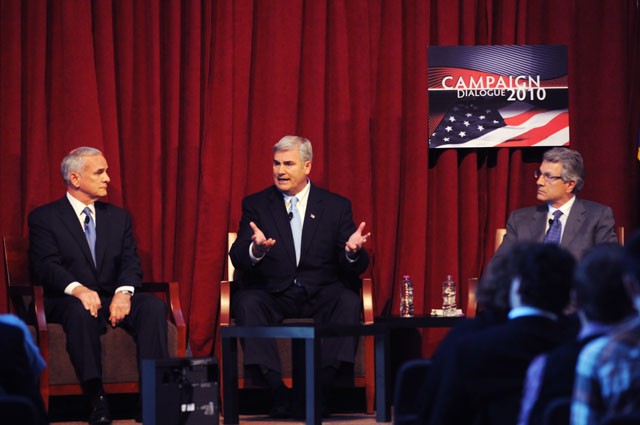A dire message for higher education resonated from the three major gubernatorial candidates at a University of Minnesota debate Friday afternoon.
The event, hosted by the Minnesota Broadcasters Association and various student groups including the Minnesota Daily, delved into the candidatesâÄô positions on higher education, the stateâÄôs economy and social issues. Hundreds of attendees watched the debate.
No matter the topic, discussion quickly turned to the importance of quashing the stateâÄôs projected $5.8 billion budget deficit. Higher education was no exception.
Promises of support to quell rising tuition were long term as each candidate said the next governor will need to address the stateâÄôs huge deficit first. It was one of the few areas of agreement in a race adhering to starkly drawn party ideology.
“We have a nearly $6 billion shortfall in the next biennium,” Independence Party nominee Tom Horner said. “To suggest that we are going to be able to use that money to significantly reduce tuition in the short term is not honest to you, so I wonâÄôt make that promise.”
The candidates also agreed education cost-saving measures are a necessity.
Republican candidate Tom Emmer said administrative spending at the University should be examined and a more student-centered, “consumer” approach should be applied to higher education.
“Perhaps we should look at some of the administration, perhaps we should look at how we make this more affordable, because inflation on college campuses is running way beyond what is going on everywhere else,” Emmer said.
EmmerâÄôs budget plan would cut $417 million from projected state higher education spending in the next budget biennium.
Horner and DFL candidate Mark Dayton have less specific proposals, but both listed education as a priority after the stateâÄôs path has smoothed. Cuts would likely come from legislative action if either were elected.
Part of DaytonâÄôs budget plan includes cutting high-paid Minnesota State Colleges and Universities system employeesâÄô salaries.
Horner also noted the next governorâÄôs unique opportunity for higher education reform as the University and MnSCU transition into new leadership.
Creating an economic climate where graduates can realistically find work was also an important part of the candidatesâÄô messages.
Emmer would use $626 million in tax cuts and streamlined state regulation to spur economic growth, while Dayton proposed a $1 billion bonding bill and a green industry fund to put people to work. He would also raise taxes on MinnesotaâÄôs highest earners.
Horner supports a $400 million bonding bill and certain tax cuts and would put an additional $30 million into research funding at higher education institutions.
When asked what qualities they would like to find in a new University president, each candidate answered slightly differently.
Emmer supported a private sector candidate for the position. Creating more public-private partnerships between the University and area businesses is one reform he would support.
An innovator in the field of higher education who could be recruited from an existing institution would make an excellent University presidential candidate, Horner said. He said heâÄôd met with members of the UniversityâÄôs search committee to discuss the issue.
Dayton said a proven leader who could “distinguish” Minnesota should get the job.
Student representatives questioned the candidates on social issues, departing from the norm in this seasonâÄôs debates.
Emmer and Dayton followed party lines in their views on gay marriage and abortion. Horner said he supported the former and would apply no new restrictions on the latter.
“This needs to be a state thatâÄôs welcoming, that opens its doors to diversity, that respects all people and celebrates their differences,” he said.
Emmer attempted to dodge social-issue questions, rounding his answers back to the stateâÄôs budget deficit and economy. He and Horner sparred, as they have in the past, over EmmerâÄôs nonanswers nearing the end of the debate.
“Those are always fun,” Horner said afterward.
When pressed on abortion by a heckling crowd member, Emmer relented.
“IâÄôm pro-life, IâÄôm the only one that is,” he said.







